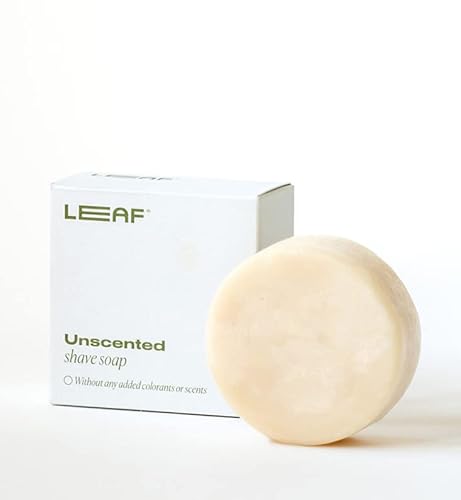
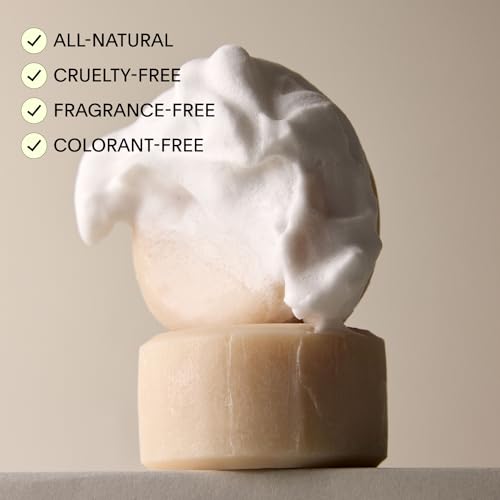
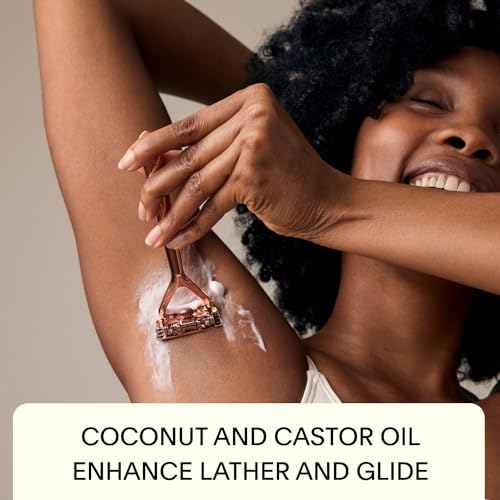
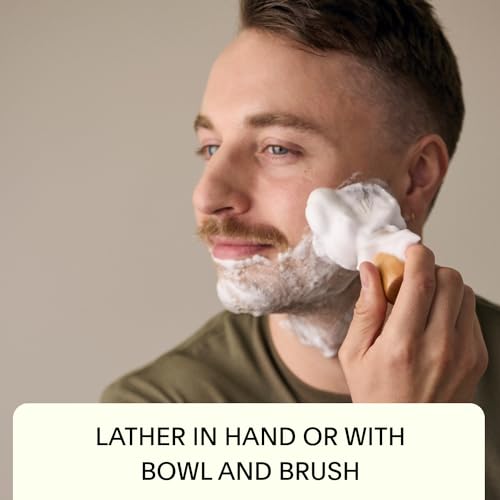
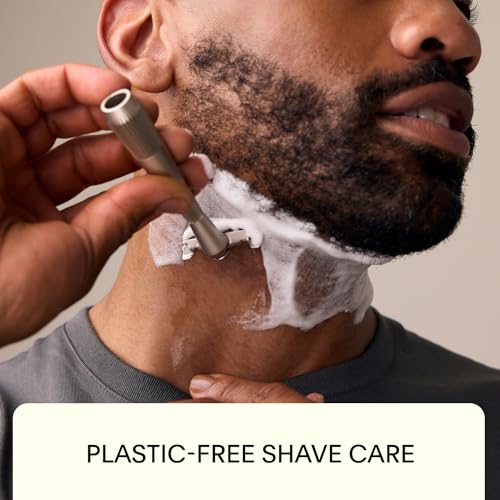
Leaf Shave Shaving Soap Bar - All-Natural, Fragrance-Free, Plastic-Free - 3oz


Potassium Hydroxide
High RiskPotassium hydroxide is a caustic inorganic base commonly used in various products for its ability to adjust pH levels and act as a cleaning agent. It is highly soluble in water and can produce heat upon dissolution, making it effective in certain formulations.
Sustai Insights
Potassium hydroxide serves as a strong pH adjuster and cleaning agent, but it poses significant health risks due to its caustic nature, which can cause irritation to skin and eyes. Environmental concerns include its potential to contribute to water pollution. Regulatory bodies have imposed strict usage restrictions due to these hazards, leading to a high-risk overall assessment. Safe handling practices are essential, and alternatives such as citric acid may provide safer pH adjustment without the associated risks.
Sodium Hydroxide
High RiskSodium hydroxide is a highly caustic and reactive inorganic compound commonly used as a pH adjuster in various products. It is effective in neutralizing acids and plays a role in the production of soaps and detergents.
Sustai Insights
Sodium hydroxide serves essential functions, particularly in adjusting pH levels, but poses significant health risks, including skin and eye irritation. It is subject to high usage restrictions due to its corrosive nature. Environmental concerns include its potential to pollute water sources and contribute to ecosystem damage. Regulatory bodies have imposed strict guidelines on its use, indicating a high-risk profile for products containing this ingredient. Safe handling practices are crucial, and alternatives include milder pH adjusters, emphasizing the need for caution in its application.
Cocos Nucifera (Coconut) Oil
Low RiskCocos Nucifera (Coconut) Oil is derived from the kernels of the coconut palm. It is primarily used in cosmetic formulations for its emollient and moisturizing properties, making it suitable for skin and hair care products.
Sustai Insights
Coconut oil serves as an effective moisturizer and emollient, promoting skin hydration and softness. It is sustainably sourced and biodegradable. Health risks are minimal, with low concerns regarding carcinogenicity, allergens, and reproductive toxicity. Environmental impact is also low, as it does not contribute significantly to pollution or bioaccumulation. Regulatory bodies have not issued restrictions on its use. Overall, coconut oil presents a low risk for health and environmental concerns, making it a safe ingredient in cosmetic products.
Vegetarian Glycerin
Low RiskVegetarian glycerin, also known as glycerol, is a colorless, odorless, and viscous liquid derived from plant sources. It is primarily used as a humectant, solvent, and emollient in various personal care products, helping to retain moisture and improve texture.
Sustai Insights
Vegetarian glycerin offers functional benefits as an effective humectant, promoting hydration and skin smoothness. It is biodegradable and typically sustainably sourced. Health risks associated with glycerin are low, with no significant concerns for carcinogenicity, allergens, or reproductive toxicity. Environmental risks are minimal, and it is not subject to major regulatory warnings. Overall, the risk level for this ingredient is low, making it a safe choice in formulations. Safe usage practices include ensuring proper concentrations in products, and alternatives such as propylene glycol exist but may have differing properties.
Water
Low RiskWater is a clear, colorless liquid essential for various biological processes. It serves as a solvent in formulations, facilitating the dissolution of other ingredients and enhancing product texture and application. Additionally, water plays a crucial role in hydration and is a key component in many cosmetic and personal care products.
Sustai Insights
Water is an effective solvent and hydrator, contributing to the texture and efficacy of formulations. It is biodegradable and generally regarded as safe, with low concerns regarding carcinogenicity, allergies, and reproductive toxicity. However, excessive water usage can lead to environmental concerns, particularly regarding resource depletion. Regulatory bodies do not impose restrictions on water use in cosmetics. Overall, the risks associated with water are low, making it a safe and essential ingredient.
Theobroma Cacao (Cocoa) Seed Butter
Low RiskTheobroma cacao (cocoa) seed butter is extracted from the roasted seeds of the cocoa plant. It is commonly used in cosmetics and skincare products for its emollient properties, helping to moisturize and soften the skin. Cocoa butter is also known for its stability and resistance to rancidity.
Sustai Insights
Cocoa butter is recognized for its effective moisturizing properties and is sustainably sourced, contributing to its appeal in personal care products. It poses low health risks, with minimal concerns regarding carcinogenicity, allergies, or reproductive toxicity. Environmentally, it does not significantly contribute to pollution or bioaccumulation. Regulatory bodies impose few restrictions, affirming its safety. Overall, the risk associated with cocoa seed butter is low, making it a favorable ingredient in cosmetics. Alternatives include shea butter or plant oils for similar emollient benefits.
Kaolin
Low RiskKaolin is a clay mineral composed of hydrated aluminum silicate. It is commonly used in various products for its absorbent properties, acting as a thickener, filler, and anti-caking agent in cosmetics, pharmaceuticals, and food applications.
Sustai Insights
Kaolin offers functional benefits such as effective absorption and thickening, making it valuable in personal care and industrial products. It is generally considered safe, with low concerns related to carcinogenicity, allergies, and reproductive toxicity. Environmental risks are minimal, as it is not known to be a pollutant or bioaccumulative. Regulatory bodies impose few restrictions, underscoring its low-risk profile. Safe usage practices are recommended, and while alternatives exist, kaolin remains a low-risk option in its applications.
Hydrogenated Soybean Oil
Low RiskHydrogenated soybean oil is an end product of the hydrogenation process applied to soybean oil, resulting in a semi-solid fat. It is commonly used in food products and cosmetics for its emulsifying and stabilizing properties.
Sustai Insights
Hydrogenated soybean oil provides effective emulsification and stability in products. It is generally recognized as safe, with low concerns regarding carcinogenicity, allergies, and reproductive toxicity. However, it may pose environmental risks if improperly disposed of, and there are regulatory restrictions on certain uses. Overall, the risk level is assessed as low, and safe usage practices should be followed. Alternatives may include non-hydrogenated oils that offer similar functional benefits.
Potassium Hydroxide
High RiskPotassium hydroxide is a caustic inorganic base commonly used in various products for its ability to adjust pH levels and act as a cleaning agent. It is highly soluble in water and can produce heat upon dissolution, making it effective in certain formulations.
Sustai Insights
Potassium hydroxide serves as a strong pH adjuster and cleaning agent, but it poses significant health risks due to its caustic nature, which can cause irritation to skin and eyes. Environmental concerns include its potential to contribute to water pollution. Regulatory bodies have imposed strict usage restrictions due to these hazards, leading to a high-risk overall assessment. Safe handling practices are essential, and alternatives such as citric acid may provide safer pH adjustment without the associated risks.
Cocos Nucifera (Coconut) Oil
Low RiskCocos Nucifera (Coconut) Oil is derived from the kernels of the coconut palm. It is primarily used in cosmetic formulations for its emollient and moisturizing properties, making it suitable for skin and hair care products.
Sustai Insights
Coconut oil serves as an effective moisturizer and emollient, promoting skin hydration and softness. It is sustainably sourced and biodegradable. Health risks are minimal, with low concerns regarding carcinogenicity, allergens, and reproductive toxicity. Environmental impact is also low, as it does not contribute significantly to pollution or bioaccumulation. Regulatory bodies have not issued restrictions on its use. Overall, coconut oil presents a low risk for health and environmental concerns, making it a safe ingredient in cosmetic products.
Vegetarian Glycerin
Low RiskVegetarian glycerin, also known as glycerol, is a colorless, odorless, and viscous liquid derived from plant sources. It is primarily used as a humectant, solvent, and emollient in various personal care products, helping to retain moisture and improve texture.
Sustai Insights
Vegetarian glycerin offers functional benefits as an effective humectant, promoting hydration and skin smoothness. It is biodegradable and typically sustainably sourced. Health risks associated with glycerin are low, with no significant concerns for carcinogenicity, allergens, or reproductive toxicity. Environmental risks are minimal, and it is not subject to major regulatory warnings. Overall, the risk level for this ingredient is low, making it a safe choice in formulations. Safe usage practices include ensuring proper concentrations in products, and alternatives such as propylene glycol exist but may have differing properties.
Water
Low RiskWater is a clear, colorless liquid essential for various biological processes. It serves as a solvent in formulations, facilitating the dissolution of other ingredients and enhancing product texture and application. Additionally, water plays a crucial role in hydration and is a key component in many cosmetic and personal care products.
Sustai Insights
Water is an effective solvent and hydrator, contributing to the texture and efficacy of formulations. It is biodegradable and generally regarded as safe, with low concerns regarding carcinogenicity, allergies, and reproductive toxicity. However, excessive water usage can lead to environmental concerns, particularly regarding resource depletion. Regulatory bodies do not impose restrictions on water use in cosmetics. Overall, the risks associated with water are low, making it a safe and essential ingredient.
Theobroma Cacao (Cocoa) Seed Butter
Low RiskTheobroma cacao (cocoa) seed butter is extracted from the roasted seeds of the cocoa plant. It is commonly used in cosmetics and skincare products for its emollient properties, helping to moisturize and soften the skin. Cocoa butter is also known for its stability and resistance to rancidity.
Sustai Insights
Cocoa butter is recognized for its effective moisturizing properties and is sustainably sourced, contributing to its appeal in personal care products. It poses low health risks, with minimal concerns regarding carcinogenicity, allergies, or reproductive toxicity. Environmentally, it does not significantly contribute to pollution or bioaccumulation. Regulatory bodies impose few restrictions, affirming its safety. Overall, the risk associated with cocoa seed butter is low, making it a favorable ingredient in cosmetics. Alternatives include shea butter or plant oils for similar emollient benefits.
Sodium Hydroxide
High RiskSodium hydroxide is a highly caustic and reactive inorganic compound commonly used as a pH adjuster in various products. It is effective in neutralizing acids and plays a role in the production of soaps and detergents.
Sustai Insights
Sodium hydroxide serves essential functions, particularly in adjusting pH levels, but poses significant health risks, including skin and eye irritation. It is subject to high usage restrictions due to its corrosive nature. Environmental concerns include its potential to pollute water sources and contribute to ecosystem damage. Regulatory bodies have imposed strict guidelines on its use, indicating a high-risk profile for products containing this ingredient. Safe handling practices are crucial, and alternatives include milder pH adjusters, emphasizing the need for caution in its application.
Kaolin
Low RiskKaolin is a clay mineral composed of hydrated aluminum silicate. It is commonly used in various products for its absorbent properties, acting as a thickener, filler, and anti-caking agent in cosmetics, pharmaceuticals, and food applications.
Sustai Insights
Kaolin offers functional benefits such as effective absorption and thickening, making it valuable in personal care and industrial products. It is generally considered safe, with low concerns related to carcinogenicity, allergies, and reproductive toxicity. Environmental risks are minimal, as it is not known to be a pollutant or bioaccumulative. Regulatory bodies impose few restrictions, underscoring its low-risk profile. Safe usage practices are recommended, and while alternatives exist, kaolin remains a low-risk option in its applications.
Hydrogenated Soybean Oil
Low RiskHydrogenated soybean oil is an end product of the hydrogenation process applied to soybean oil, resulting in a semi-solid fat. It is commonly used in food products and cosmetics for its emulsifying and stabilizing properties.
Sustai Insights
Hydrogenated soybean oil provides effective emulsification and stability in products. It is generally recognized as safe, with low concerns regarding carcinogenicity, allergies, and reproductive toxicity. However, it may pose environmental risks if improperly disposed of, and there are regulatory restrictions on certain uses. Overall, the risk level is assessed as low, and safe usage practices should be followed. Alternatives may include non-hydrogenated oils that offer similar functional benefits.
Experience the smooth, eco-friendly shave you've been searching for with Leaf Shave's All-Natural Shave Soap Bar. Crafted for both men and women, this 3 oz fragrance-free soap enhances your shaving routine while caring for the planet.
- Enhanced Shaving: Formulated to provide an exceptional glide for a close, irritation-free shave, ensuring a comfortable experience.
- Rich Lather: Create a luxurious, creamy lather easily by rubbing the soap in your hands, on your skin, or with a shaving brush for optimal results.
- Plastic-Free: Reduce your environmental footprint with this plastic-free bar soap, eliminating unnecessary waste without compromising quality.
- Unscented Formula: Enjoy a completely natural product free from artificial fragrances and colorants, perfect for sensitive skin.
- Natural Ingredients: Made with nourishing ingredients like coconut oil and cocoa butter, this soap hydrates and soothes while you shave, promoting healthy skin post-shave.
Subscribe & Save with Sustai
- Best Price Guarantee: Always enjoy the lowest prices on sustainable home essentials.
- No Surprises: We’ll notify you before shipping. No hidden fees, ever.
- You’re in Charge: Change, pause, or cancel your subscription anytime with ease.
- Eco-Friendly Deliveries: Our grouped shipments mean less packaging and lower emissions.
Join us on a sustainable journey. Special offers for a limited time! Prices and promotions may change.
Recommended Products
Experience the smooth, eco-friendly shave you've been searching for with Leaf Shave's All-Natural Shave Soap Bar. Crafted for both men and women, this 3 oz fragrance-free soap enhances your shaving routine while caring for the planet.
- Enhanced Shaving: Formulated to provide an exceptional glide for a close, irritation-free shave, ensuring a comfortable experience.
- Rich Lather: Create a luxurious, creamy lather easily by rubbing the soap in your hands, on your skin, or with a shaving brush for optimal results.
- Plastic-Free: Reduce your environmental footprint with this plastic-free bar soap, eliminating unnecessary waste without compromising quality.
- Unscented Formula: Enjoy a completely natural product free from artificial fragrances and colorants, perfect for sensitive skin.
- Natural Ingredients: Made with nourishing ingredients like coconut oil and cocoa butter, this soap hydrates and soothes while you shave, promoting healthy skin post-shave.

You can have at most 2 Sustainable Steals products in your cart
Customer Reviews
Customers’ View
Customers appreciate the effectiveness and eco-friendly nature of the Leaf Shave Soap Bar, highlighting its all-natural and fragrance-free formulation as a great choice for sensitive skin. Many users note the product's ability to create a rich and creamy lather, which enhances glide for a smooth and comfortable shave. Positive feedback emphasizes that a little goes a long way, making it long-lasting and economical. The plastic-free design resonates well with environmentally conscious consumers, promoting sustainability. Overall, customers find this product both effective for their shaving needs and aligned with their commitment to a healthier and greener lifestyle.
AI-generated from the text of customer reviewsThis product has no reviews yet.




